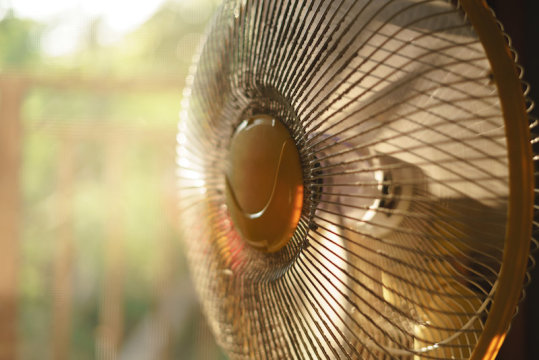[ad_1]
The safety and effectiveness of electric fans in heatwaves depend on the climate and basing public health advice on common weather metrics could be misleading, according to a new study from the University of Sydney.
The research calls into question current guidelines from most public health authorities, including the World Health Organization, that suggest fans may not be beneficial when the temperature rises above 35 degrees Celsius (95°F), as well as recommendations based on heat index caps.
Researchers from the University’s Thermal Ergonomics Laboratory simulated heatwave conditions to examine the effect of electric fan use on an individual’s core temperature, cardiovascular strain, risk of dehydration and comfort levels.
The results, published today in Annals of Internal Medicine, show that in a hot, humid condition with a heat index of 56 °C (133°F) fans lowered core temperature and cardiovascular strain, and improved thermal comfort.
However, fans were detrimental for all measures in very hot, dry conditions despite a lower heat index of 46 °C (115°F).
Heat index is a commonly used weather metric that expresses both air temperature and relative humidity. It was designed to help convey how hot weather conditions feel to the average person.
The United States Environmental Protection Agency (USEPA) states that fan use above a heat index of 37.2°C (99°F) “actually increases the heat stress the body must respond to.”
Senior author Associate Professor Ollie Jay of the Faculty of Health Sciences and Charles Perkins Centre said recent conditions in Europe and the United States reinforce the urgent need for evidence-based health advice to help protect people against heat-related illness.
“Our results suggest that under environmental conditions that represent the vast majority of peak heatwaves in the United States and Europe fans should be recommended and the guidelines issued by most public health authorities are unnecessarily conservative,” said Associate Professor Jay.
“It is only when the air temperature is very high and humidity is very low that fans are detrimental, which can be seen in arid conditions such as Phoenix or Las Vegas in the US, or Adelaide in South Australia.”
Methods
Twelve healthy male volunteers were monitored for thermal strain (rectal temperature), cardiovascular strain (heart rate and blood pressure), risk for dehydration (whole body sweat rate), and thermal comfort (assessed using 120-mm visual analogue scale) over a two-hour exposure to simulated peak conditions of two types of heat waves.
One was very hot and dry replicating the peak conditions of the California heatwave in July 2018, and the other was cooler but more humid with a higher heat index representing the peak conditions during the Chicago heatwave in July 1995, and Shanghai heatwave in July 2017.
Next steps
Associate Professor Jay said while larger studies are needed, the current research and earlier work published in the Journal of the American Medical Association suggests that neither temperature or heat index caps are the best basis for public health advice on the use of fans.
His team is currently examining the effectiveness of a range of different low-resource cooling strategies that can be easily implemented in different heatwave conditions by the elderly and people with medical conditions like coronary artery disease. They are also assessing the impact of different prescription medications on the type of advice that should be issued to the general public in advance of extreme heat events.
Declaration: Associate Professor Jay reports grants from the NSW Office of Environment & Heritage Human Health and Social Impacts Node during the conduct of the study, and grants from National Health and Medical Research Council outside the submitted work.
Story Source:
Materials provided by University of Sydney. Note: Content may be edited for style and length.
[ad_2]















